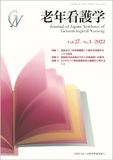Japanese
English
- 販売していません
- Abstract 文献概要
- 参考文献 Reference
抄録
終末期医療での高齢者の意思決定支援においては,看護の専門的自律性とコミュニケーション能力が不可欠である.そこで,「看護の専門的自律性を基盤としたアサーティブ・コミュニケーション能力向上プログラム(PAN-AC)」を開発し,一般病院の看護師に実施して効果を評価した.講義やグループ討議を内容とするプログラム全4回に参加した32人を分析対象とし,介入前後の測定値でWilcoxon符号付順位検定を行った.「看護の専門的自律性」を評価する看護の専門的自律性測定尺度は,下位因子「認知能力」「実践能力」が介入前に比して介入後は有意に高値となった.「アサーティブ・コミュニケーション能力」を評価する日本語版RASは,下位因子「非主張的な自己表現」が介入前に比して介入後は有意に高値となった.プログラムが,終末期医療における高齢者の意思決定支援に有効との示唆を得た.
In end-of-life care for aged patients, it is necessary that nurses are able to exercise professional autonomy and offer assertive communication to support patients' decision making (Sato et al., 2019). We developed PAN-AC, a program focusing on “professional autonomy of nursing” (PAN) and “assertive communication” (AC) with the aim of improving nurses' skills. A pilot program was conducted with nurses working in a general hospital. We collected pre- and post-intervention measurements on nurses, who participated in a total of four sessions including lectures and group discussions, and applied a Wilcoxon signed-rank sum test to the measured values. Subscales of the Professional Autonomy in Nursing Scale (Kikuchi et al., 1997), “cognitive ability” and “practical ability”, indicated significantly higher values after intervention compared to before intervention. The subscale of the Japanese version of the Rathus Assertiveness Schedule (Shibuya et al., 2007), “non-assertive self- expression” was significantly higher after intervention than before intervention. The results showed that the program is effective in supporting aged patients' decision making at end of life.
Copyright © 2022, Japan Academy of Gerontological Nursing All rights reserved.


